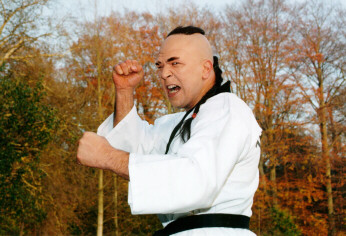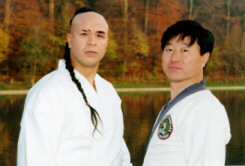Michel Qissi
by TMAN Freelance Writer Ben Smith
Michel Qissi may not be a household
name yet but in martial arts circles it is one name that is certainly drawing
attention. You may know Michel as "Tong Po" in the film "Kickboxer".
As boyhood friends he and Jean-Claude Van Damme became intrigued with movies
and martial arts. Quite an exciting combination.
 It
takes guts to travel to America to find that certain dream. But they did
and despite the usual "Don't call us we'll call you" attitude they sometimes
received, they did persevere and won the battle for themselves and what
they believed in. Michel Qissi has much more to say about that battle here
this month in TMAN's Martial Arts Magazine.
It
takes guts to travel to America to find that certain dream. But they did
and despite the usual "Don't call us we'll call you" attitude they sometimes
received, they did persevere and won the battle for themselves and what
they believed in. Michel Qissi has much more to say about that battle here
this month in TMAN's Martial Arts Magazine.
BS: Michel Qissi, it is an extreme pleasure to
discuss your career. Can you first tell us when and where the Martial
Arts entered your life? (At what age?)
MQ: I was about seven years old and doing English
style boxing at the time when I met another boy with many of the same interests
as me who was doing Shotokan Karate, we began to show each other the techniques
from the other ones system. That's really when I started learning the martial
arts.
BS: You were an action film lover...Any particular
heroes that you tried to emulate?
MQ: I admired many heroes, but I have always
felt that you have to be your own person and not try to be like anyone
else. It is a good idea to learn from other great people, but don't try
to be them. Everyone has their own special gifts which they must discover
and nourish..
BS: You and friend Jean-Claude Van Damme had the
same dreams. How did you meet?
MQ: He was the boy I mentioned who was doing
the Shotokan Karate. We grew up together with the same love for action
films and training in martial arts and boxing. We went to see the action
movies together and trained for the goal of one day being great action
film stars ourselves.
BS: What style of martial arts have you trained
in?
MQ: I have trained mainly in Shotokan, but also
Muay Thai boxing and kickboxing.
BS: Did you get most of your training in Europe?
MQ: Yes, most of the training has been in Europe.
When I was 17, I was the amateur champion boxer in my weight class. I studied
Muay Thai in Thailand and of course some training in the States.
BS: You have a great story about how you got into
film work. Can you tell us how that adventure began?
MQ: Yes. Basically, in 1982 I came to Hollywood
together with Jean-Claude Van Damme in search of a career as an action
star. We endured some very hard times over the next four years. We worked
many odd jobs, often slept on the beach, and still continued to trainand
hung in there until 1986 when we got our first big roles in Bloodsport
with Cannon pictures. After that we signed a contract for three more movies
and it went on from there.
BS: What was your first film role? How did that
come about?
MQ: Bloodsport was the first major film for us.
We managed to obtain an interview with Mr. Golan from Cannon pictures.
Once we got there, Jean-Claude did his famous splits between two chairs,
but Golan was not impressed. After a while he had seen enough and told
us he didn't think we were right. I told him he was making a big mistake
because Jean-Claude was working on a big picture at the time with Arnold
Schwartzenegger. This caught his attention and he had his secretary call
over to 20th Century to confirm the story. Sure enough the agent
at 20th Century said that there was a Jean-Claude Van Damme playing the
role of the villain in the movie with Schwartzenegger. What the agent didn't
say was that the villain was a monster and that Jean-Claude was in a costume
which covered his face. Golan gave us chance after hearing that and that
is really where everything began to happen for us.
BS: Bloodsport is where your first lead role came
about, but it was almost shelved. How was it rekindled to the point of
staggering success?
MQ: Yes, we were very disappointed at first.
Our fist big movie and it was sitting in the drawer! So Jean-Claude and
I decided to market the film ourselves. We met some Malaysian film producers
at the Milan film festival who were interested in releasing the film in
Malaysia. The movie was a huge success there and when Golan heard about
it he decided to try a release on the west coast of the United States,
which met with total success.
BS: Of course you were and still are known as
Tong-Po from the movie Kickboxer. Since the make up was so well
done, did any of your friends even recognize you?
MQ: Even my mother did not recognize me.(ha ha
ha) Some people knew my body movements from when they had seen me box,
but not the face.
 BS:Tell us about the other movies you were in and do you consider yourself
a martial artist first and actor second or just the opposite or both?
BS:Tell us about the other movies you were in and do you consider yourself
a martial artist first and actor second or just the opposite or both?
MQ: Well my first love goes back to the movies.
I also love to train but my main ambition is the creative side, the directing,
and the choreography. I have worked on the choreography for many of the
fight scenes which I was in, as well as others and really enjoy the creative
process and working with the fighters and directing.
BS: Do you feel more comfortable behind the camera
as a fight choreographerproducer/director or are you more at home as an
on screen actor?
MQ: .I feel at home on both sides of the camera.
I am more interested in the more creative side now, directing and choreography
but not so much producing. Of course I am involved in all aspects of making
the films now. I am very interested in making a good quality film first
so I have to make sure that everything from the casting to the editing
is done right so that the final product comes out just right.
BS: What do you see in the future for martial
arts? Do you think fans are getting tired of those violent revenge
type films? Is there more that can be realized for the softer world of
martial arts like the losophy/hope/dreams?
MQ: I like movies which send a strong message,
like COMA, the one I am working on now, especially to the young
people. I believe that the softer side of the martial arts, and the philosophy
can help build the hopes and dreams and make young people realize that
anything is possible. Movies have to show the social problems of today
so that everyone can relate to them but they must also show a viable solution
to the problems and give the people hope. They must show the positive side
of things as well.
BS: What is in the future for Michel Qissi?
MQ: Only God Knows, I hope to do as many movies
as possible, but it must be done right. I look for results. I am interested
to send messages to the new generation, and also help the old understand
the young. I think the old and the young have a lot to offer one
another.
 BS: Tell us more about WCCF.
BS: Tell us more about WCCF.
MQ: The World Cinema Combat Federation is an
organization which I have formed together with Grand Master Beom Jhoo Lee
to teach people how we do fight scenes in the movies. The WCCF is training
instructors to teach Cinema Combat(tm) to martial artists who are interested
to be action movie stars. There are lots of people out there who know they
can be great action stars but do not know where to start or how to get
going. The WCCF is a great way to go. Movies have to show all kinds of
people so that everybody can have someone to relate to on the screen, so
there is room for every kind of face and body to be action stars as well.
BS: What would you tell someone really interested
in a career in action films?
MQ: It is not impossible, but you must work,
step by step. Take some acting classes, train in the martial arts find
an organization like the WCCF that can help get you started in the right
direction. Put together strong demo tape and give it out only when you
feel it is really strong and you are ready. Contact directors to send the
tape to because they are the ones who can help you.
BS: Michel, thank you again for the opportunity
to interview you and best of luck with your future with WCCF and the film
industry.
MQ:Thank you for the opportunity to talk with
you.
If you are an aspiring martial arts actor/actress
and want to learn more about theWCCF e-mail Matthew Survis at survis@geocities.com
or check out the web page at http://www.geocities.com/Colosseum?Loge/4657.
 It
takes guts to travel to America to find that certain dream. But they did
and despite the usual "Don't call us we'll call you" attitude they sometimes
received, they did persevere and won the battle for themselves and what
they believed in. Michel Qissi has much more to say about that battle here
this month in TMAN's Martial Arts Magazine.
It
takes guts to travel to America to find that certain dream. But they did
and despite the usual "Don't call us we'll call you" attitude they sometimes
received, they did persevere and won the battle for themselves and what
they believed in. Michel Qissi has much more to say about that battle here
this month in TMAN's Martial Arts Magazine.
 BS:Tell us about the other movies you were in and do you consider yourself
a martial artist first and actor second or just the opposite or both?
BS:Tell us about the other movies you were in and do you consider yourself
a martial artist first and actor second or just the opposite or both?
 BS: Tell us more about WCCF.
BS: Tell us more about WCCF.